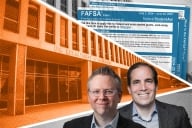You have /5 articles left.
Sign up for a free account or log in.
BALTIMORE -- Every year the Common Application becomes more popular, as more institutions seek to join, and those already in report increases in applications.
Success, of course, can attract competition, and a few years ago the Universal College Application started operations, largely on a similar model. But on Thursday, a company that has specialized in helping high schools deliver transcripts electronically to colleges announced its acquisition of a company that helps deliver and process application materials to colleges -- and announced a new product called the SuperAPP that it says will significantly ease the application process. The new style of application indeed has some capabilities that go beyond the Common Application (and also some limitations).
But the debate that ConnectEDU (the company offering the SuperAPP) set off goes beyond the relative technical strengths of the two services. The Common Application has long prided itself on letting in as members only those institutions that pledge to use "holistic admissions" in which candidates are evaluated on a broad range of considerations, one of which must be an essay.
ConnectEDU argues that these requirements effectively exclude the many institutions that serve large populations of low income students, and that the best way to get those students enrolled is to keep application materials to an absolute minimum. Indeed, one of the original colleges participating in the new venture is Bowie State University, a historically black public college in Maryland that, because it does not require an essay on its application, would be automatically ineligible for the Common Application.
Raising the stakes, ConnectEDU is currently in discussions about some sort of collaboration with Universal. ConnectEDU made the announcement here at the annual meeting of the National Association for College Admission Counseling, where all the players are visible at the conference. (Universal requires only that colleges be accredited to participate; they need not have any specified admissions policies.)
The Common Application started operations in 1975, long before students were applying online, but using a system that was tailor-made for the Internet era of admissions. For years, the system was most popular with smaller private colleges, but it has grown to include larger and better known institutions, including the Ivies and some leading public institutions. Colleges have the option of requiring a supplemental application with institution-specific questions. Nearly 400 colleges are now members (compared to 80 for Universal, with some institutions in both systems).
The ConnectEDU idea is to encourage applications to multiple institutions in a different way. The company has gathered copies of 1,100 applications from Web sites and other public sources. An applicant would tell the company the names of colleges he or she wanted to apply to, and then software would produce an application that in the first part would include all questions and information that was common among all of the institutions. Then the software would produce the questions that are different or that require different answers (such as questions about why someone wants to enroll at a particular institution). Further, the SuperAPP would be especially valuable for students in the 2,500 high schools where ConnectEDU handles high school transcripts: the answers to all factual information would automatically be entered into the application, minimizing what students need to do.
The application would then be sent off -- and the college's application fee (at least this year) will be passed on entirely to the college. In the future, ConnectEDU hopes to arrange modest fees to the colleges per application (in the $3 to $6 range), with the idea that savings should be so great for colleges that they could afford those fees and also to cut their application fee charges. Students at high schools that don't use ConnectEDU for transcripts could still use the service, but would have to use standard procedures for transcript delivery.
Craig Powell, CEO of ConnectEDU, said that the SuperAPP's services are designed to make things as easy as possible for potential students, based on widespread research showing that simplified processes encourage students -- especially those without much understanding of college -- to apply. "This is about access," he said, adding that the colleges that most low-income students attend make decisions based on basic information. The idea that everyone must write an essay or answer many questions beyond grades and test scores is "a perpetuation of elitism," he said.
Many colleges run their admissions systems in non-elitist ways, but they haven't had the advantages that the Common Application provides, he said.
Because so many Common Application colleges require supplements, he said, "it's not really so common any more," and students must really answer lots of different questions. Grouping questions together -- and letting in colleges without essay requirements -- "is about eliminating inefficiencies and costs," he said. And this approach, Powell said, opens the advantages of dual applications to all kinds of institutions, including community colleges, that couldn't get in to the Common Application.
The institutions that are "access institutions" in that they reach many first generation and low income students are effective with admissions forms that don't look like those of the colleges in the Common Application, he said, and they shouldn't be looked down on for systems that are effective at expanding access to higher education.
ConnectEDU plans to use its transcript network to expand the new business. For example, ConnectEDU already does the transcripts for the Baltimore City Schools. Dean Richburg, specialist on college access for the school system, said that it would make the SuperAPP the standard way for students to apply to college, starting this year. He said that it would allow high schools to encourage more applications and to prepare materials at faster rates -- while letting students find out more quickly if they have been admitted.
Lonnie Morris, director of admissions at Bowie State, said that at a time when "students feel inundated" with requirements for college applications, he thinks simplicity will go a long way to attracting more students. "This provides the ultimate convenience to the student," and he said that should be the top priority.
Rob Killion, executive director of the Common Application, said he didn't want to comment directly on ConnectEDU, but he defended the rules that guide his organization. Those rules, he said, are based on "the mission of the organization and its members" and their belief that holistic admissions systems are best for the students. He noted that while Common Application members include some of the most competitive colleges in the country, other members are "nearly open admissions." He said that the Common Application "doesn't tell colleges how competitive to be," only that each admissions decision be based on an individual analysis of a variety of factors.
Holistic admissions offers "the full context of a student's life," he said.
Killion stressed that the Common Application is a nonprofit organization and acts as such. If the members dropped the requirements about essay questions and holistic admissions, membership could triple or quadruple in a year, he said. "But we're not about market share and profit margin," he said. "The mission of the Common Application isn't to take over college admissions for the entire country."








